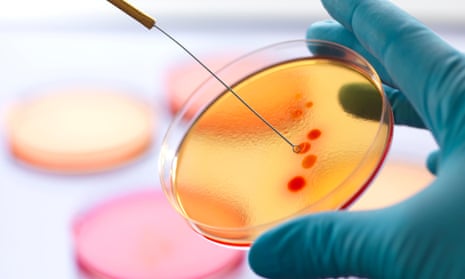Antimicrobial resistance to antibiotics will present a greater danger to humankind than cancer by the middle of the century unless world leaders agree international action to tackle the threat, according to George Osborne.
The British chancellor will tell a panel of experts at an IMF meeting in Washington that 10 million people a year could die across the world by 2050 – more than the number of people lost to cancer every year – without radical action.
Osborne will warn of an enormous economic cost, which could cut global GDP by 3.5%, a cumulative cost of $100bn (£70bn). The chancellor will say: “Unless we take global action, antimicrobial resistance will become an even greater threat to mankind than cancer currently is.
“It is not just a health problem but an economic one, too. The cost of doing nothing, both in terms of lives lost and money wasted, is too great, and the world needs to come together to agree a common approach.”
Dame Sally Davies, the chief medical officer for England, has warned of an “apocalyptic scenario” in the next two decades in which people die of routine infections during simple operations “because we have run out of antibiotics”. A government-commissioned review in 2014 by the economist Jim O’Neill, now a Treasury minister in the Lords, estimated that antimicrobial resistance would become the world’s greatest killer by 2050 unless a new generation of effective antibiotics are developed.
In a Guardian article, the director of health and HIV at the UN Development Programme, Mandeep Dhaliwal, warned of a return to the era before Alexander Fleming’s discovery of penicillin. “We are on the road back to the days of people dying from common infections and injuries,” Dhaliwal wrote.
The chancellor will tell the meeting in Washington, which will be attended by the director general of the World Health Organisation, Dr Margaret Chan, and the former US Treasury secretary, Larry Summers, that radical steps need to be taken to shift incentives for pharmaceutical companies to develop new antibiotics.
Warning that the current reimbursement models for antibiotics and diagnostics are broken, Osborne will back a proposal from O’Neill to create “market entry rewards”, which will pay a premium to pharmaceutical companies that manage to bring a new antibiotic to market.
The chancellor will say: “My message here at the IMF meeting in Washington is that we need the world’s governments and industry leaders to work together in radical new ways. We have to dramatically shift incentives for pharmaceutical companies and others to create a long-term solution to this problem, with new rewards, funded globally, that support the development of new antibiotics and ensure access to antibiotics in the developing world.
“To achieve a long-term solution we also need better rapid diagnostics that will cut the vast amounts of unnecessary antibiotic use.”
But Kerry McCarthy, the shadow environment secretary, accused the government of adopting a complacent approach to the looming crisis.
In a speech to the Antibiotics and Farming Conference in London, McCarthy accused ministers of adopting a “negative role” in EU negotiations over calls by the European parliament to end the routine use of preventative antibiotics in farming.
McCarthy said the government has rightly set targets for human use of antibiotics but has wrongly failed to set any targets for veterinary use of antibiotics when farm animals account for 40% of antibiotic use in the UK.
The shadow environment secretary said: “Whilst GPs are increasingly urged to take action, antibiotic usage in farming tends to escape scrutiny. But farm animals account for almost two thirds of antibiotics used in Europe, and around 40% in the UK.
“Lack of ambitious enough action in reducing their overuse in farming risks undermining any progress that’s made in human medicine. It seems illogical to set measurable reduction targets for human health – in the government’s five-year AMR strategy – but not in veterinary use.
“GPs are being advised to apply vigorous tests on patients to see if drugs will be effective before prescribing them; and the health regulator, NICE, has even suggested that soft touch doctors should be sanctioned for over-prescribing. But routinely dosing healthy animals with close analogues of these drugs is still being permitted.”
The warning by the chancellor follows a call by a group of City investors, who control more than $1tn in assets, to fast food, pub and restaurant chains to cut back on the use of antibiotics in their meat and poultry supply chains.
The letter, signed by Aviva Investors, Strathclyde Pension Fund and Coller Capital, warned of a “significant risk of drug-resistant bacteria developing” in light of the fact that 80% of all antibiotics used in the US and 45% in the UK are given to farm animals.











Comments (…)
Sign in or create your Guardian account to join the discussion